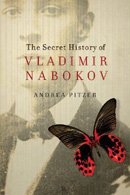Speak, playthings: Nabokov’s synesthesia and memory
For some people, sound has taste. Vladimir Nabokov saw the alphabet in color. Both are examples of synesthesia, in which a person experiences a second, paired sensation accompanying an initial different kind of sensory input. A study out last month in Psychological Science suggests that though it is possible synesthesia is hardwired into individuals, many […]
Pnin, the Cremona Women’s Club, and Jewish refugees after the war
Nabokov was crazy for complex allusions, intentionally seeding his fiction with literary and historical references, from pop culture and epic poetry to both in a single line (see “Chapman’s Homer” from Pale Fire). But there are so many winks and nods and proper names in his books, sorting out what has coherence from what is […]
Vladimir Nabokov’s immigration file
It’s pretty neat what you can learn from government archives. The first image series to be posted on the Records page of this site is Vladimir Nabokov’s immigration file, with documents spanning 1940 to 1945. Aside from pictures of the author, which are always interesting, the government forms offer their own sly narrative of Nabokov’s […]
Foreign publishers for The Secret History; more grim news out of St. Petersburg
On the “exciting news” front, The Secret History is now slated for publication in Russia and Poland. Russian house Sindbad Publishers Limited and Polish publisher Muza will be translating and printing the book in their respective countries. I’m particularly grateful that publishers in places so profoundly bound up with Holocaust and Gulag tragedy are interested in Nabokov’s […]
Nabokov and concentration camps, part II
During the course of writing The Secret History, I was staggered by the stories I heard from sources and translators whose family lives had been shaped in brutal ways by political prisons and concentration camps. Some, like Nabokov’s family, had fled Russia westward away from Revolution or pogroms, only to have to escape Germany or […]
Nabokov, concentration camps, and a century of civilian casualties
Vladimir Nabokov was born in 1899, less than three years after the first concentration camps were founded thousands of miles away in Cuba. What does Vladimir Nabokov—creator of decadent fiction and king of literary insults—have to do with concentration camps? It’s a reasonable question. Like Nabokov, concentration camps were born in the nineteenth century but […]
